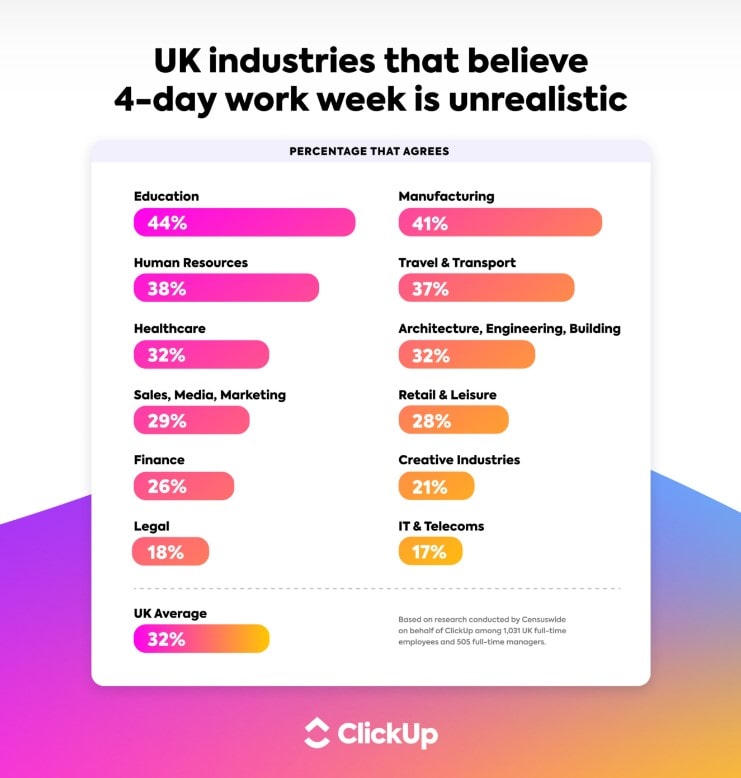Disadvantages of a 4-Day Work Week
Though enticing, the 4-day workweek has some drawbacks too. Discover potential challenges it may pose for industries, communication, and team management.

Due to the pandemic's impact and the rise of remote work, employees now prioritize work-life balance more than ever. A staggering 92% of workers prefer a 4-day workweek. With the increasing acceptance of remote work, the popularity of this concept has grown.
Although a 4-day workweek may seem enticing, it is important to acknowledge the challenges it presents for employers and employees.
So, what are the potential drawbacks of implementing a four-day workweek?
Let’s delve into these concerns and explore the limitations associated with the four-day work plan.
What Is a 4-Day Workweek?

A 4-day workweek typically refers to a schedule where employees work for 32 hours instead of the usual 40 while receiving the same compensation and benefits. This condensed workweek is achieved by working longer hours on each of the four days.
The specific arrangement of the 4-day workweek can vary, with some companies opting for Monday to Thursday, or Tuesday to Friday schedules.
Many employees prefer the 4-day workweek because it improves work-life balance.
Recent statistics indicate that 78% of the workforce experienced reduced stress levels as a result of transitioning to a 4-day workweek.
What Are the Disadvantages of a Four-Day Workweek?
According to several studies, implementing a shorter workweek has been shown to bring immense benefits for both employees and employers.
These benefits include enhanced productivity, recruitment of top talent, happier and healthier staff, reduced carbon emissions, improved staff retention, and fewer employee sick days.
However, it's important to note that the 4-day workweek does have its challenges for certain companies and workers.
So, let's now delve into some of the weaknesses associated with this system.
1. Fewer Hours Means Less Time to Get Things Done
While studies have shown that a 4-day workweek can enhance productivity, it also presents a challenge. With fewer hours in the week, there may be limited time to accomplish all necessary tasks.
This makes the 4-day workweek impractical for certain industries, including:
- Healthcare and emergency services that require 24/7 coverage
- Retail and hospitality businesses that have direct client interactions
- Large enterprises with complex operations
Would you like a 4 day work week?
2. It Could Be More Stressful
No doubt the 4-day workweek offers you more leisure time during long weekends, but there is a potential downside to consider.
According to Boston University, employees would still be required to complete the standard eight-hour work tasks within the condensed four-day schedule, meaning they must fit 40 hours of work into 32 hours.
This compressed timeframe can create added stress and pressure, potentially leading to burnout and increased stress levels.
3. Morale Boost From a 4-Day Workweek May be Short-Lived
Initially, employees may experience the excitement and perceived benefits from introducing a 4-day workweek, also known as the Hawthorne effect. This positive sentiment might create the illusion of success for the 32-hour workweek.
Also, the evidence shows that a shorter workweek can improve morale by providing employees with more time for relaxation and overall well-being, leading to increased spirit.
However, it's important to note that a 4-day workweek may not address the underlying causes of low morale in the workplace.
Factors such as:
- Lack of training
- Lack of trust
- Lack of communication and clear instructions
- No team bonding
- Lack of thanks or praise
- Micromanagement
- Dishonesty
Therefore, even adopting a 4-day workweek, may not significantly enhance motivation if the root causes of low morale remain unresolved.
4. Negative Impact on Customer Satisfaction
A four-day workweek can negatively impact customer satisfaction.
A study conducted in Utah found that customers expressed dissatisfaction due to the closure of government offices on Fridays, which restricted their access to services.
Organizations that need to maintain continuous communication with clients can utilize AI-powered websites and chatbots. These tools enable businesses to respond to customers' needs without time constraints, ensuring unrestricted availability.
Certain services may require a human presence to address client or user concerns. So, implementing a four-day workweek may not be an ideal solution in such cases.
5. It might Not Work for Every Employee
As the concept of a four-day workweek gains global attention, many employees are asking businesses to consider this new system. While it is innovative, it may not suit all your employees.
Implementing a shorter week for factory workers, for instance, can disrupt the production process and potentially lead to underproduction.
If the factory relies on a specific number of workers daily, losing a day's labor could result in a backlog of unfinished products and delays in customer deliveries.

According to ClickUp, workers in various sectors were not convinced about the effectiveness of a four-day workweek.
Examples include:
- Manufacturing (41% of employees)
- Human resources (38% of workers)
- Travel (37% of the workforce)
Therefore, it is advisable not to adopt a four-day workweek approach. Instead, consider starting with a pilot program during slower business periods. This way, you can assess the impact of the new work schedule on clients, the company, and customers
7. Communication Hurdles and Reduced Availability
Having everyone off on Fridays can pose challenges for scheduling meetings in a 4-day workweek schedule that runs from Monday to Thursday. With limited workdays, finding suitable time slots for meaningful discussions becomes an uphill battle.
Additionally, when your team is off on Fridays, it can create obstacles to communication with other companies and customers. The reduced availability during those days may hinder timely responses and interactions.
8. Difficult Team Management
A five-day workweek effectively manages large-scale operations and facilitates collaboration across multiple teams. The extra days and hours provide enough time to accomplish plans and tasks.
However, condensing the same workload into a four-day, 32-hour workweek can be challenging and overwhelming. Handling complex projects and coordinating with multiple teams within this shortened timeframe can become daunting.
On the other hand, businesses with few employees may find it easier to adapt to a 32-hour workweek. Dealing with smaller teams can be more manageable in this scenario.
9. Not Suitable for Every Industry
Different industries have unique requirements, so a four-day workweek may not suit every sector or occupation. Consider the potential impact if teachers and healthcare professionals adopt a shorter workweek.
Reducing work days can cause big problems for students and those who need constant health care.
For example, school hours might need to be extended to make up for fewer teachers, and childcare services would have to be made available for longer hours to accommodate the change in the workweek.
Similarly, other industries such as manufacturing, personal support, and development support work (e.g., administering first aid) would require substantial changes if they were to shift to a four-day workweek.
Summing Up

Numerous studies have demonstrated the benefits of a four-day workweek for companies. But, it's important to note that implementing this approach may not be feasible for every industry or employee.
The concept of a 4-day workweek is still experimentation to determine its feasibility for businesses worldwide.
However, if you are eager to experience a four-day workweek schedule and are actively seeking a job opportunity, visit the 4 Day Week.
Here, you can browse the current job openings and explore positions that offer a 4-day workweek schedule.